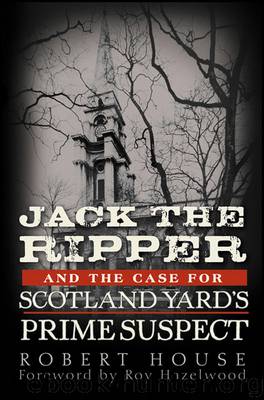Jack the Ripper by Robert House

Author:Robert House [House, Robert]
Language: eng
Format: epub, mobi
Tags: Murder, True Crime, Serial Killers, (¯`'•.¸//(*_*)\\¸.•'´¯)
ISBN: 9780470938997
Google: cHlOondey1oC
Amazon: 0470938994
Publisher: Wiley
Published: 2011-03-10T05:00:00+00:00
18
Anderson’s Suspect
Moral certainty: (n.) in a criminal trial, the reasonable belief (but falling short of absolute certainty) of the trier of the fact (jury or judge sitting without a jury) that the evidence shows the defendant is guilty. Moral certainty is another way of saying “beyond a reasonable doubt.” Since there is no exact measure of certainty it is always somewhat subjective and based on “reasonable” opinions of judge and/or jury.
—www.Law.com
The police investigation of the Ripper murders has been much maligned over the years as an inept and disorganized affair that ultimately was responsible for the failure to solve the case. As head of the CID in 1888, Sir Robert Anderson was in overall command of all criminal inquiries in Metropolitan London, including the Ripper crimes, and thus much of the blame for this failure inevitably fell on him. Such criticism clearly rankled Anderson, and he seemed to have taken it personally.
As a matter of public record, a police “failure” in the case would seem hard to argue against. Yet Anderson’s remarks on the matter painted a somewhat different picture. Over the years, he made a number of comments about Jack the Ripper, first hinting at and then stating outright that the killer’s identity was known to the police, and that it was a “definitely ascertained fact” that Jack the Ripper was a Polish Jew who had been “caged in an asylum.”1 The suspect, according to Anderson, had been “unhesitatingly identified” by “the only person who had ever had a good view of the murderer,” but unfortunately, the witness refused to testify in court, and the police lacked sufficient evidence to convict the Ripper in a court of law. Despite this, Anderson reiterated that it was “a simple matter of fact” that his Polish Jew suspect was guilty. “It is not a matter of theory,” he said2
As a result of these statements, Robert Anderson has since become perhaps the most controversial figure in all of Ripperology, and a number of Ripperologists have dismissed his statements completely, characterizing him as incompetent, boastful, and untrustworthy3 But one wonders whether such criticism is based on an objective judgment of Anderson’s character or simply on a reluctance to accept that the most fascinating and baffling of unsolved mysteries was indeed solved more than a hundred years ago, with little applause or fanfare. Clearly, Anderson’s character would never have attracted the scrutiny it does, were it not for his statements about the Ripper’s identity. Indeed, the criticisms of both Anderson’s character and his abilities as leader of the CID seem to fly in the face of his long tenure as assistant commissioner of the CID, his ability to effectively communicate with his fellow officers, and a marked reduction in crime during his time with the Metropolitan Police. By most accounts, Anderson was a competent leader, highly esteemed by his colleagues, and especially accustomed to dealing with sensitive matters regarding state security. In 1892, the year after Aaron Kozminski’s incarceration, Anderson was described as “a tallish
Download
This site does not store any files on its server. We only index and link to content provided by other sites. Please contact the content providers to delete copyright contents if any and email us, we'll remove relevant links or contents immediately.
| Espionage | Hoaxes & Deceptions |
| Murder & Mayhem | Organized Crime |
| Serial Killers | White Collar Crime |
Mindhunter: Inside the FBI's Elite Serial Crime Unit by John E. Douglas & Mark Olshaker(9341)
Wiseguy by Nicholas Pileggi(5784)
Room 212 by Kate Stewart(5120)
Hitman by Howie Carr(5095)
Secrecy World by Jake Bernstein(4753)
Killers of the Flower Moon: The Osage Murders and the Birth of the FBI by David Grann(4447)
Papillon (English) by Henri Charrière(4274)
Breaking Free by Rachel Jeffs(4217)
Killers of the Flower Moon by David Grann(4055)
Say Nothing by Patrick Radden Keefe(3985)
American Kingpin by Nick Bilton(3886)
The Secret Barrister by The Secret Barrister(3708)
Molly's Game: From Hollywood's Elite to Wall Street's Billionaire Boys Club, My High-Stakes Adventure in the World of Underground Poker by Molly Bloom(3536)
Mysteries by Colin Wilson(3454)
In Cold Blood by Truman Capote(3384)
Signature in the Cell: DNA and the Evidence for Intelligent Design by Stephen C. Meyer(3138)
I'll Be Gone in the Dark by Michelle McNamara(3082)
Rogue Trader by Leeson Nick(3043)
Bunk by Kevin Young(2997)
